Steve Ellner says opposition to NATO’s stance on Ukraine has created fertile ground for the expansion of a bloc of non-aligned nations, now with a progressive possibly at the helm.
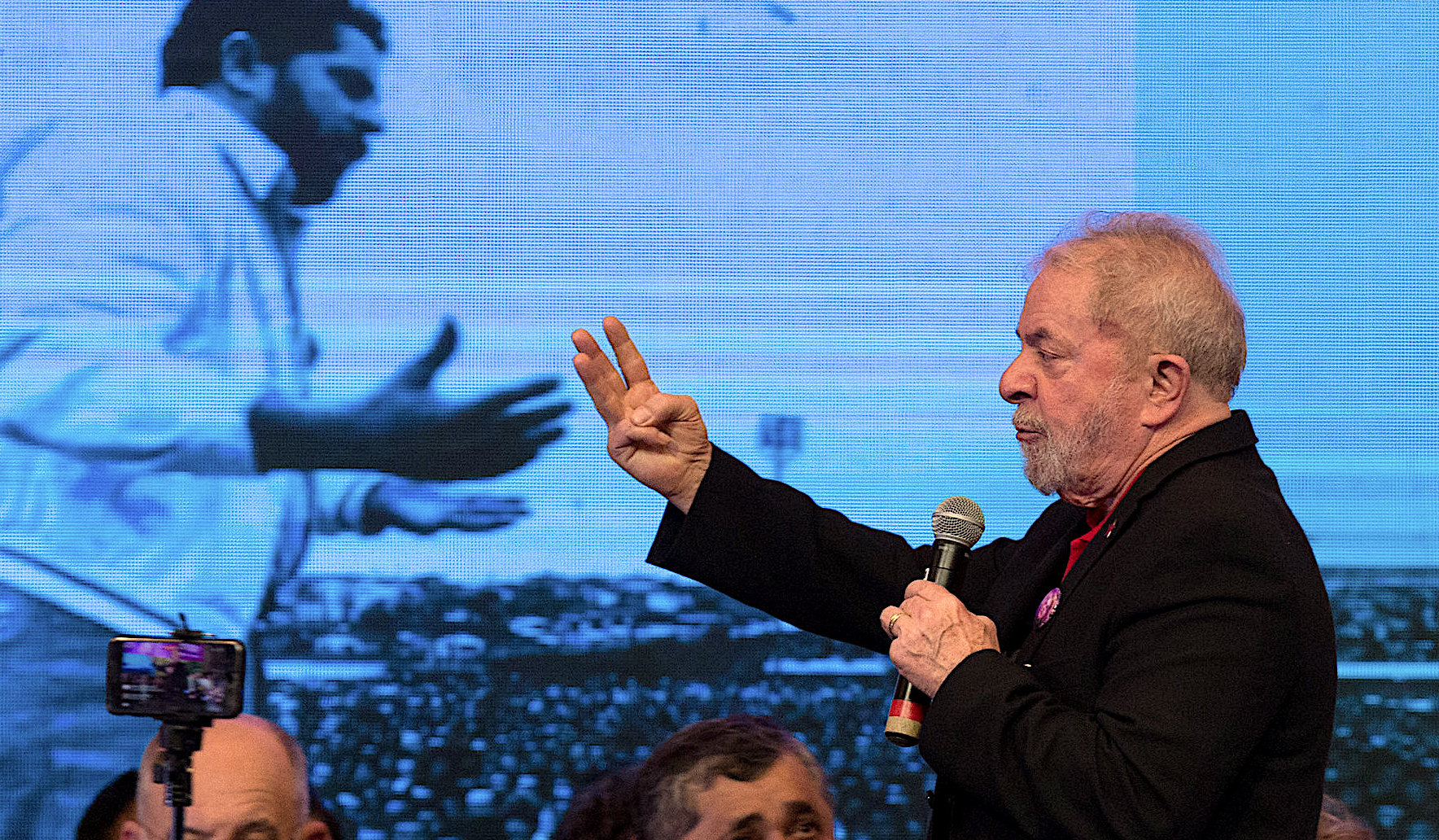
Lula da Silva speaking at the national congress of the PT Party in 2017. (Lula Marques/Agência PT, CC BY 2.0)
By Steve Ellner
Special to Consortium News
 President Joe Biden kept a promise to Lula da Silva by congratulating him for “free, fair and credible” elections minutes after Sunday’s results declared Lula the winner over incumbent Jair Bolsonaro. The U.S. did so to avoid the loser from refusing to concede.
President Joe Biden kept a promise to Lula da Silva by congratulating him for “free, fair and credible” elections minutes after Sunday’s results declared Lula the winner over incumbent Jair Bolsonaro. The U.S. did so to avoid the loser from refusing to concede.
Pundits have interpreted the Biden administration’s words on the Brazilian election as a demonstration that it was rooting for Lula over his opponent, known as “Tropical Trump.” This reasoning is at best misleading, if not completely faulty.
What has Washington actually most worried about Lula is the reemergence of a powerful non-aligned movement and the prospect that a progressive like Lula would be at the helm. During his previous two presidencies, Lula cast himself as a spokesman for the Global South.
Times have changed since then. There is a growing number of ideologically diverse governments, which were formerly subservient to the U.S. and are now boldly defying Washington’s dictates, creating fertile ground for the expansion of a bloc of non-aligned nations that has been reinvigorated by opposition to NATO’s stance on Ukraine.
The vast majority of the world’s population, from China and India to South America and Africa, have not joined the sanctions regime against Russia and are gradually coalescing around an a new and emerging economic, financial and commercial system alternative to the West.
Furthermore, the total inability of the world’s major powers, specifically the U.S. and Western Europe, to broker an agreement to end the Ukraine conflict, opens space for a leader like Lula, who throughout his career has excelled at negotiating with politicians of diverse political orientations.
Foreign Policy in the Forefront
Lula’s victory on Sunday was razor-thin with 50.9 percent of the vote to 49.1 for Bolsonaro. Just as during his past presidencies (2003-2010), the center and right, including Bolsonaro’s allied parties, will control congress. This unfavorable balance of power will undoubtedly force Lula into making concessions on the domestic front, such as possibly softening his campaign pledge to tax the rich.
But on foreign policy he will be under less domestic pressure and is poised to keep his campaign promise to play a key role in regional and world affairs. In his victory speech in Sao Paulo on Sunday he pledged to reverse Brazil’s “pariah” international status, the result of Bolsonaro’s contempt for diplomacy and his outrageous statements, such as blaming China for Covid and Leonardo DiCaprio for the Amazonian fires in 2019.
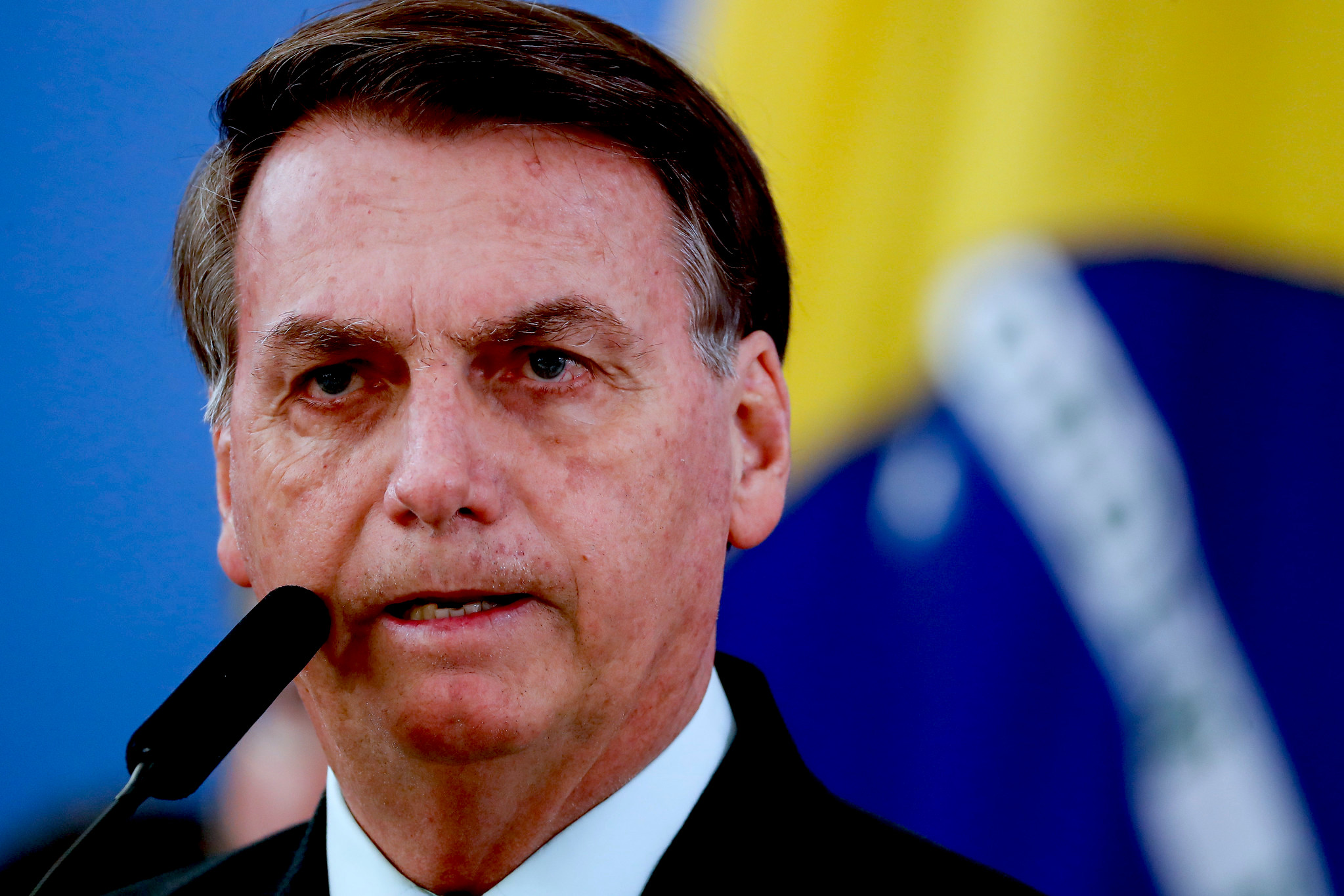
Brazil’s President Jair Bolsonaro in April 2020. (Palácio do Planalto, Flickr, CC BY 2.0)
Shortly after first coming to power in 2003, the Washington establishment viewed Lula as a reliable moderate and a counter to firebrands such as Hugo Chávez, Evo Morales and Néstor Kirchner. Mexico’s former foreign minister, Jorge Castañeda, in his famous book Leftovers: Tales of the Two Latin American Lefts, praised Lula as levelheaded and contrasted him with the “bad left” of Chávez & Co. whom he characterized as “populist” and “anti-American.”
But the favorable characterization of Lula changed in 2010, not as a result of Lula’s domestic policies, but rather his foreign policy, specifically his recognition of a Palestinian state on the basis of 1967 borders. A half dozen other Latin American governments then followed suit. The same year Lula, in the words of Reuters, “angered Washington” over his talks with Mahmoud Ahmadinejad and his defense of Iran’s nuclear program.
After that, Lula was no longer the pragmatic leftist answer to irresponsible populism, but was rather portrayed as a populist himself. The Wall Street Journal titled an article on the first round of the presidential elections held on Oct. 2, which put Lula ahead, “Populism Wins Brazil’s Election.” WSJ editor Mary Anastasia O’Grady wrote: “Now candidate Lula is again promising moderation. His greatest political advantage is his image as a benevolent populist.”
Rhetoric is an important element of populism, but in Lula’s case, what the U.S. is worried about are concrete actions he may take as president that would challenge U.S. hegemony. The threat stems largely from the bloc of five powerful nations that form BRICS: Brazil, Russia, India, China, and South Africa.
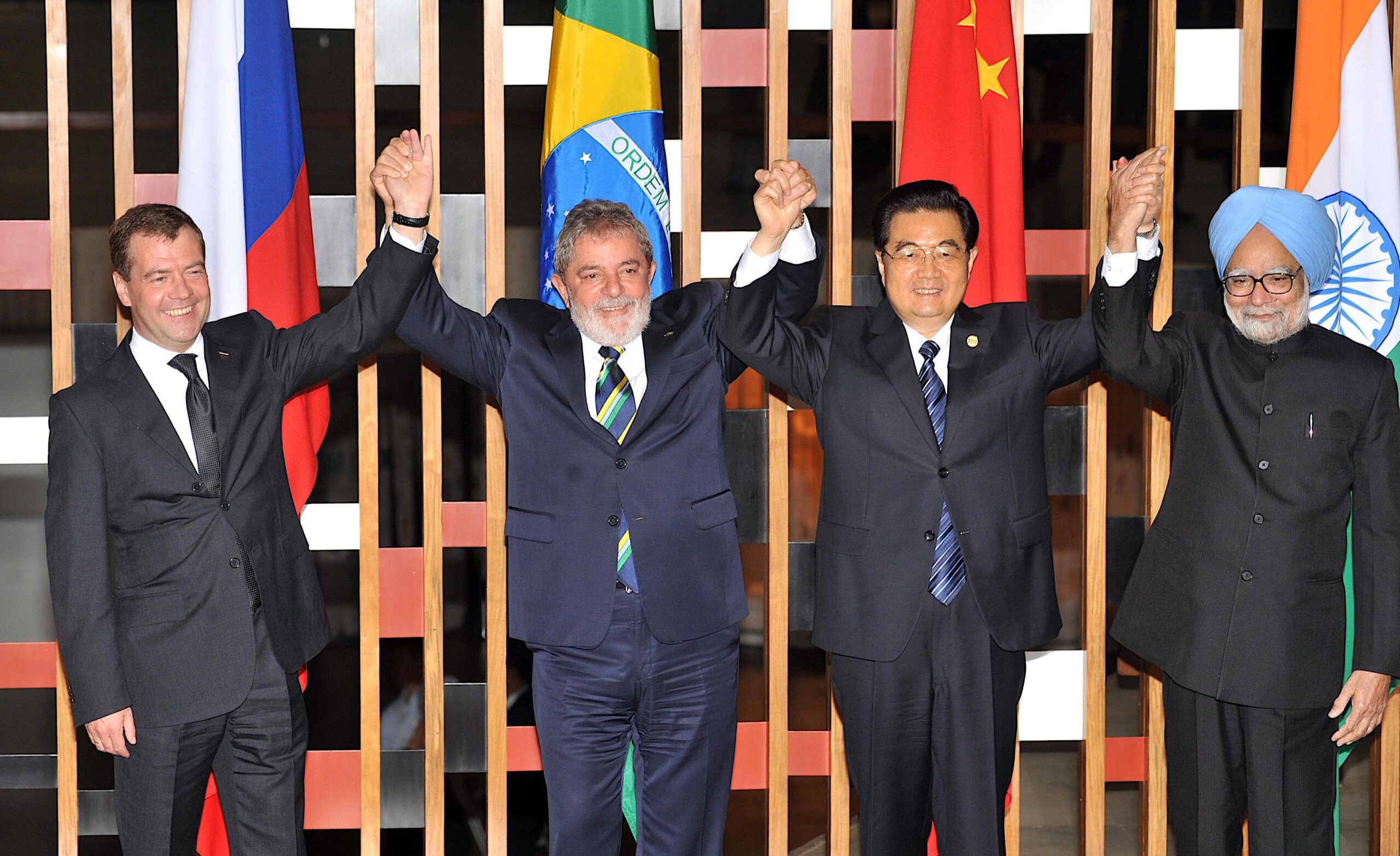
Lula da Silva, second from left, with BRIC leaders in 2010. (José Cruz/ABr, CC BY 3.0, Wikimedia Commons)
Skeptical Washington officials and pundits had dismissed the group’s summits as “talk shops” by governments that had little or nothing in common. That was the gist of then Secretary of State Mike Pompeo’s “Remember BRICS?” tweet upon leaving office, in which he insinuated that India’s and Brazil’s fear of Russia and China made the organization useless.Now, two years later after Ukraine and with Lula as president-elect, that skepticism appears completely unfounded.
Lula was imprisoned in 2018 on what his supporters say were trumped-up corruption charges. In a 2019 prison interview, he declared “BRICS was not created to be an instrument of defense, but to be an instrument of attack.” His references this year on the campaign trail to BRICS, as well as regional organizations such as the Community of Latin American and Caribbean States (CELAC) (which Bolsonaro withdrew from) and the Union of South American Nations (UNASUR), reinforced this message. After meeting with Lula the day after his triumph on Monday, Argentine President Alberto Fernández said, “‘with Lula, we will now have an activist for our bid’ to join BRICS.”
Washington views BRICS’ expansion as a threat, exacerbated by Russia’s and China’s membership in the organization. In the closing weeks of Brazil’s presidential campaign, the National Endowment for Democracy (NED), wrote:
“With the BRICS … set to expand to include Argentina, Iran, and possibly Egypt, Saudi Arabia, and Turkey, Russia may acquire even more partners, ones that together represent a significant percentage of global GDP and a large percentage of the world’s population.”
How ‘Neutral’ is Lula?
Washington can’t be at all pleased by Lula’s position on the Ukrainian conflict. Lula has insisted that BRICS play a role in the search for a negotiated solution and is committed to attempting to broker a peace deal. In the words of Telesur, Lula said “peace could be reached at a bar table, which caused uneasiness in the diplomatic representation of Ukraine in Brazil.”
But it’s not only the fear that Lula is closer to Russia and China than he is to Washington (which he is) that keeps U.S. policymakers up at night. Unlike Washington, Lula has acknowledged the legitimacy of Venezuelan democracy and, according to journalist Ben Norton, told local media that U.S.-recognized president Juan Guaidó is a “warmongering criminal who should be in prison.”
On the eve of the election, Lula told the Economist “People only talk about Nicaragua, Cuba, and Venezuela. Nobody talks about Qatar. Nobody talks about the United States.”
A BRICS Currency
Lula has insisted, since his Workers’ Party lost power in 2016, that the BRICS’ major shortcoming was its failure to launch a new currency to rival the dollar. In an interview from prison, Lula recalled, “When I discussed a new currency… Obama called me, telling me, ‘Are you trying to create a new currency, a new euro?’ I said, ‘No, I’m just trying to get rid of the U.S. dollar.’”
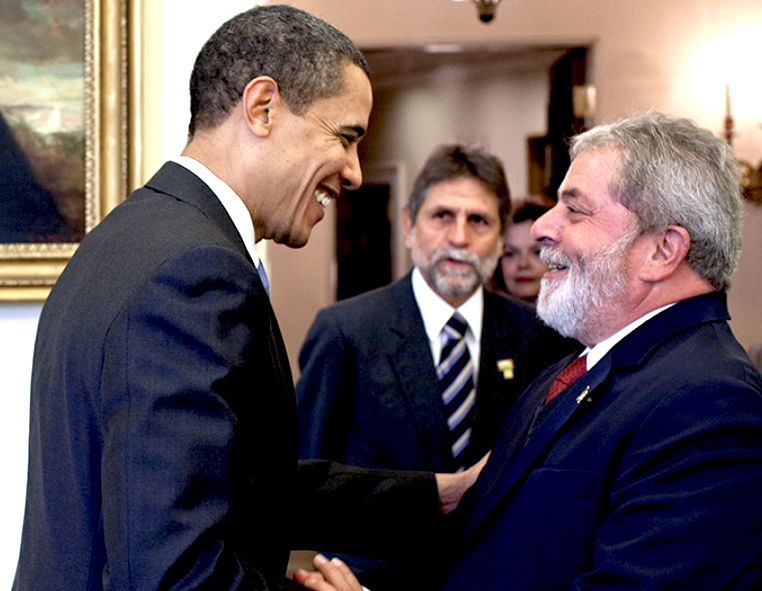
March 14, 2009: President Barack Obama welcoming Brazilian President Lula Da Silva, to the Oval Office. (White House, Pete Souza)
Prospects for a BRICS reserve currency are much more promising in 2022 and its five member countries are behind the idea. Indeed, this year the currencies of all five BRICS nations have outperformed the Euro.
Washington’s political weaponization of the dollar goes beyond the super-power rivalry with Russia and China as U.S.-imposed international sanctions have brought misery to people of the Global South including to Cuba, Venezuela, Iran, and Nicaragua.
One Pole Against Many
The notion of a “multipolar world” frequently invoked by Lula envisions the emergence of diverse blocs including that of the non-aligned nations. An article in this summer’s issue of Foreign Policy by Shivshankar Menonor, a national security expert, reflects the thinking of many in Washington who are wary of non-alignment.
“When the international system is failing or absent …, it is no surprise that leaders turn to nonalignment. The more the United States, Russia, China, or other powers pressure other countries to choose sides, the more those countries will be drawn to strategic autonomy, which could create a poorer and crueler world as countries reduce external dependence and consolidate their homefronts.”
Some on the left are also uneasy. Longtime political activist Greg Godels calls multipolarity “a notion first discussed by bourgeois academics looking for tools to understand the dynamics of global relations” and adds “there are no guarantees that the poles that emerge or challenge the post-Cold War super-pole are a step forward or a step back simply because they are alternative poles.”
The presence of the racist government of India’s Narendra Modi in BRICS and Saudi Arabia’s desire to join it cast doubts on the organization’s progressiveness.
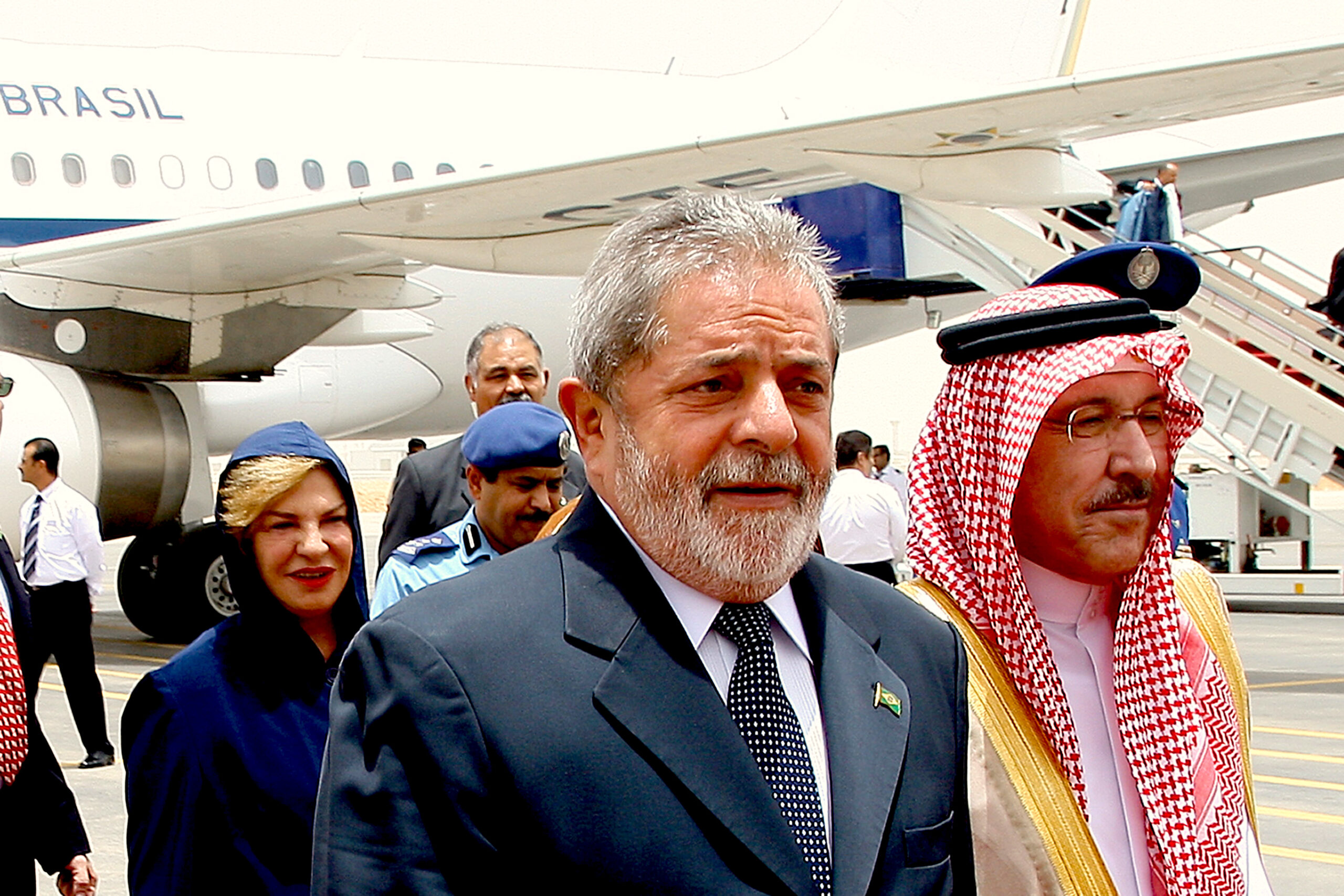
Brazilian President Lula da Silva visiting Saudi Arabia, May 2009. (Ricardo Stuckert/CC BY 3.0 br, Wikimedia Commons)
Saudi Arabia’s recent surprising decision to buck the U.S. by rejecting Biden’s plea to pump more oil to help lower international prices and hurt Russia doesn’t make the nation any less reactionary. But that’s precisely why the leadership of a progressive like Lula at the world level is of such importance – and causes alarm in Washington.
The original non-aligned movement (NAM) was founded in the 1950s by leaders like Josip Broz Tito, Gamal Abdel Nasser and Kwame Nkrumah, were all left leaning and committed to socialism. The movement played a key role in favor of decolonization, disarmament, and opposition to racism and apartheid.
NAM still exists but the Soviet Union is gone, one of the two powers the movement was not aligned with. Only the U.S. remains. Lula has not hidden his criticism of the U.S., even his suspicion that U.S. investigators collaborated with Brazilian prosecutors in putting him behind bars, an accusation that has been well documented by the news outlet Brasilwire.
Lula is poised to become the leader of the progressive tide that has swept Latin America, beginning with Andrés Manuel López Obrador’s victory in Mexico in 2018.
The real question is whether Lula will put his political savvy to the test by playing a leadership role in favor of a progressive brand of multipolarity in a growing movement worldwide that is challenging U.S. hegemony and that cuts across the political spectrum – and how Washington will react to it.
Steve Ellner is a retired professor from Venezuela’s Universidad de Oriente and currently an associate managing editor of Latin American Perspectives. His latest book is his co-edited Latin American Social Movements and Progressive Governments: Creative Tensions between Resistance and Convergence(Rowman and Littlefield, 2022).
The views expressed are solely those of the author and may or may not reflect those of Consortium News.

Lula is no clear enemy of the US, he is at worst only a level-headed frenmy of the West, including the US. As an independent thinking and aspiring statesman he has been merely rooting for a multi-vectored foreign policy for Brazil and accordingly reorienting himself to a multi-polarity focused BRICS as a healthy developmental alternative especially given America’s less than satisfactory track-record in Latin America in that regard. Biden’s enthusistic welcome of Lula is merely indicative of his desire to keep Lula as his frenmy rather than having to deal with him as a open rogue especially given America’s growingly unpopular aggressive stance in Ukraine and its negative impacts on the global economy and on world stability. Biden a hard-headed idealist and Lula a pragmatic realist wouldn’t mind sharing opposite sides of the same bed as they proceed !
Lua would have had a bigger majority if the Brazilian Army hadn`t blocked Polling Stations used by Indian Native Voters. Lua was President of Brazil in 2009 , The 2008 Wall Street Crash was still
destroying World Wide Economies. Gordon Brown, the UK`s “Saviour of the World”. He Gave UK Banks £ 300 Billion, He Visited Brazil to “Save” it`s Economy. Lua told him that the Crisis was caused by “Blue-Eyed, White Men “. Lua Saved Brazil from Wall Street`s Looting.
It is high time to realize that America is NOT Latin America’s friend as it always wants Latin Americans to believe. Quite the contrary. Years ago, then Argentinian president Kirchner was negotiating with the IMF and is reported to have commented: “why is it, that every time we get our heads above water, you push us down again”. This is the American mentality…take down those who might be competitors.
The idea that BRICS will form its own currency is quite far-fetched. Of course, the future is unknowable, but the example of the Euro – essentially the Deutschmark – has been disastrous for the weaker European economies, whom the Eurocrats refer to as the PIGS (Portugal, Italy, Greece, Spain). One of the great benefits of being a nation state is having your own currency and being able to print money. Russia and China are in the process of becoming autarkies, which involves having complete control over their own currency and financial policy. How would Brasil, India or South Africa – as weaker powers – benefit from giving up financial autonomy?
Empires come and go and are replaced until these new ones also come and go, provided, of course, that climate change slows considerably to allow modern humanity’s survival.
“What Worries the US Most About Lula”?
Answer: The leadership example of truth that a person such as he represents for all the peoples’ of the world to see!
Some information that is possibly salient to Greg Godels’ noted comments in the article and Steve Ellner’s reflection thereupon:
“[T]he BRIC concept was first proposed in a Goldman Sachs white paper called ‘Building Better Global Economic BRICs,’ where Goldman’s then-chief economist, Jim O’Neill, identified Brazil, Russia, India and China as the world’s four fastest-growing developing nations and suggested that ‘world policymaking forums should be re-organised’ to reflect this fact. (BONUS FACT: Jim O’Neill is now chair of the Chatham House Council.)
[…]
Of course, the fact that the BRICS actually originated in a Goldman Sachs white paper is not in and of itself reason for suspicion of the grouping. To argue such would be to employ the genetic fallacy. But […] that is most assuredly not the only reason to be suspicious of claims—frequently heard in certain quarters of […] ‘independent’ media—that the BRICS are actually some sort of anti-globalist organization.
For instance, […] the BRICS’ New Development Bank (NDB)—touted in those same pro-Putin/pro-Xi circles as an alternative to the International Monetary Fund (IMF)/World Bank mafia—is in fact staffed by the head stooges of that very IMF/World Bank mafia:
‘What none of these experts has bothered to report (for obvious reasons) is the remarkable fact that the Vice President of the NDB is also an Executive Board member of the IMF, who then went on to pledge cooperation and joint action between the NDB and IMF. Also missing from this narrative is the fact that the NDB’s chief, Kundapur Vaman Kamath, is a former staffer of the supposed NDB ‘rival’ Asia Development Bank.'”
Source:
James Corbett, “The OTHER Globalist Conference,” The Corbett Report (Substack), June 26, 2022
Since NDB has 4 vice-presidents, guess this information may be also useful. The one that was on IMF Executive Board was likely ex UNSC president Paulo Nogueira Batista. He seems to have been appointed during Lula’s presidency in spite of being, at least at that time and in words, a critic of IMF.
The UNSC president was his father (dates make sense).
As long as the U.S. NATO and G7 behave like a White Supremacist Russophobic, Synophobic, hegemony that thinks it deserves to rule the world because that’s the way the cookie crumbles; rejects the reality of a multipolar world; allows itself to be led around by the nose by delusional NEOCONS; as described by the late GREAT most dear to those of us who read and reread his articles, Robert Parry:
hxxps://consortiumnews.com/2015/03/20/a-family-business-of-perpetual-war/
this “EMPIRE” will continue to target the rest of the world and will be seen as an existential threat to life on the planet.
Lizz Truss was cavalierly waving nuclear threats around before she was dismissed as the shortest surviving UK PM.
Many people who are worried about this are hoping against hope for a soft landing.
Hoping that wiser heads – BRICS & SCO are the only emerging and growing economic power bases which could somehow exert their economic power in such a way that the dangerous NEOCON policies implode and are finally discredited and perhaps some mature leadership emerges from the hysteria….
I am reminded of the character of Trulane in the original Star Trek TV series, (the childish troublemaking all powerful alien from Star Trek 1) who wreaks havoc on the crew of the Enterprise and is finally calmed when his disembodied parents order him to leave the humans alone and come in from playing.
‘oh, allright’….he grudgingly agrees….and Kirk, Spock, Dr McCoy et al…breath a sigh of relief.
As whimsical as this sounds, as Randy Newman wrote in his song “A Few Words on Behalf of my country” I hope we all have that opportunity….that reprieve from Armageddon
Newman’s song ends with
“The end of an empire is messy at best, This one will end like all the rest”….goodbye, goodbye, goodbye……….(sotto) good bye…
Bolsonaro hasn’t accepted his defeat and is looking to the military for support
That’s a really important point. Without support from the military, it is difficult for leftist governments to maintain power. That was the genius of Chavez. Being from the Venezuelan military, he understood the need to have support for the revolution from the military. That’s why all the coup attempts there have failed.
I read somewhere, FWIW, that the army supports Lula and the Navy & Air Force support Bolsinaro. And the Army is about the same size as the Navy & Air Force combined…Sorry, I don’t remember where I read that or even if it’s true. But it’s something to think about, I guess.